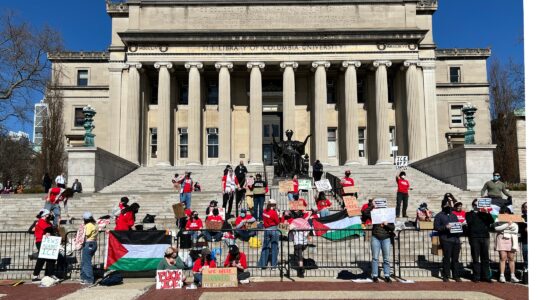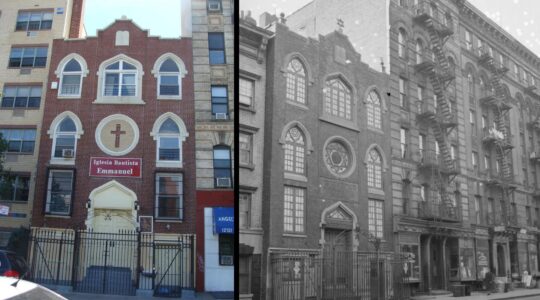In his 20s, for the customary post-army stint, Ran Levy came to New York. He tried his hand at acting, participated in a few musical productions, but after six months with no remarkable achievements acknowledged that “it was time to start acting like a responsible adult” and, as his parents advised, “go home, study something practical, and get a real job.” He returned to Israel and enrolled for a bachelor’s in behavioral studies in Tel Aviv University.
Besides acting, clinical psychology had been Levy’s longtime passion. He had always felt drawn to intense emotions. An empathic listener, people naturally wanted to confide in him, and he in turn felt “honored and touched — that they would trust me like that, that they would open up and let me into their lives.”
As part of his studies, Levy interned at a suicide hotline. “In the beginning it was rough,” he admits. “I took it personally every time I felt I wasn’t making a big enough difference in a caller’s life. But with time I understood that in the limited capacity of a phone call, all I can expect to do was little things. … I could listen, provide a 20-minute window of relief.”
His hotline experience led him to his next position as a paralegal. In 2005, Motley Rice, a large American law firm, opened a branch in Tel Aviv for a class action against a Saudi bank suspected of funneling funds to terrorist organizations. The plaintiffs were 6,000 Israelis who had lost family members or were injured in terrorist attacks in Israel between 1995 and 2005.
Levy was hired to listen to the bereaved families’ testimonies, find and collect documents supporting them, and prep the plaintiffs for depositions. In the beginning, this put him on the receiving end of a lot of pent-up grief and anger. “To them I was a stranger, an outsider, who barges into their lives and forces them to relive their hardest moments,” he explains.
People wept, yelled and hung up on him, but being conciliatory and attentive — the kind of guy people naturally want to confide in — Levy eventually convinced even the most embittered clients to cooperate. Within two years he was promoted from being case manager to a dozen or so families to case manager of the entire clientele, with a team of 30 paralegals at his disposal. It was the most important position he had filled in his life.
“Out of the 6,000 terror victims we represented, I spoke personally to about 4,500,” he notes. “I knew their names, their stories, the injuries they sustained. I knew the names of the children or spouses they lost.”
Obviously, the testimonies he collected were haunting. Some victims recounted becoming mere shells of themselves, surviving on a cocktail of meds and despair. Others couldn’t sleep, were afraid to leave the house, were crippled by frequent panic attacks.
There was one woman, Levy recalls, who had lost both her son and her husband in consecutive terror attacks over two years. He would call periodically and she would tell him, with heart-rending optimism, how she was trying to build back her life. There was a young man, about his age, whom a terror attack had left blind and deaf. The last face he would see, the man wrote to him, was that of the suicide bomber, at the moment in which he was blown apart.
Levy would sometimes picture that image when he closed his own eyes.
As a paralegal, Levy was well aware that his job was not to get involved. He knew he had to put aside any aspirations to help people: the goal was to get in, get the necessary information, and get out. Perhaps it was the nature of the information they shared, or the nature of Israeli relationships in general, but things did indeed get personal. Clients would call him on his cell phone (which was also his work number) all day long, before, during or after work hours.
They called to wish him happy holidays or invite him to a wedding or a memorial, or get upset that the money hadn’t materialized yet, or to cry. Levy would always answer. “It was immensely rewarding that the same people who slammed the phone in my face were now calling just to chat,” he explains. “I had to justify the trust they put in me.”
His team of paralegals needed his attention as well. “Each paralegal would come back from their meetings with the bereaved families flooded with charged information,” he recalled. “They all needed to tell me about it, to get it off their chests. So I listened to them all, the clients, the workers. … All this pain, it was my job to channel it.”
The rougher the job got, the more devoted Levy became to it. As the trial drew near, it eclipsed everything else in his life: girlfriends, friends, movies — all that seemed increasingly remote. He lost all patience with social trifles. The faces of the dead, looking up from his desk, seemed far more relevant than those of the living.
One day, driving by a group of armed soldiers by a roadblock in Jerusalem, Levy’s heart began racing. Even when he was already blocks away, it was hard for him to breathe. It hit him for the first time that this could really happen to him, just like it happened to his clients — right then, right there, there could be a terrorist attack, and he could die. The possibility of death had never felt so real before: it was as if a blindfold had been removed from his eyes.
After that, death was ever-present. Three years into the job Levy was experiencing a second-hand version of the post-traumatic symptoms his clients complained about: he became nervous, impatient with anything but work. He was uncomfortable in crowded places, easily startled. If his parents didn’t answer the phone, or if they called at an unusual hour, he’d panic.
“I’ve memorized so many terror scenes, had thousands of scenarios of how things can go wrong in my head, and I imagine them happening to the people I loved,” he describes. “I’m ashamed to admit this, but sometimes I wished something terrible would happen to them already so I could stop being afraid of it.” By then, he had been seeing a psychologist for some time.
In 2012, the case went to trial, and Levy’s work was finally completed. For the first time in a long while he took a good look at his life, and decided to start over. He returned to New York, and enrolled to study method acting in the Lee Strasberg Institute.
“This experience made me realize, truly, that something could happen to me at any given moment,” he remarks. “So as long as I’m young and physically capable I should chase my dreams, practical or not.”
New York and acting have revived him, he says; they have given him a new zest for life. But it is clear to him that if anything, his experience with Israel’s bereaved has cemented his ties to the country. He feels more than ever that Israel is an inseparable part of who he is, part of his psychological makeup.
“I always think of Israel as a country in post-trauma, and I believe this shaped all of us who grew up in it. Israel has imprinted us,” he says. “After all it put me through, I don’t feel I could belong anywhere else.”
Orli Santo is a correspondent for the New York-based weekly Yediot America. Her column appears monthly.
The New York Jewish Week brings you the stories behind the headlines, keeping you connected to Jewish life in New York. Help sustain the reporting you trust by donating today.




